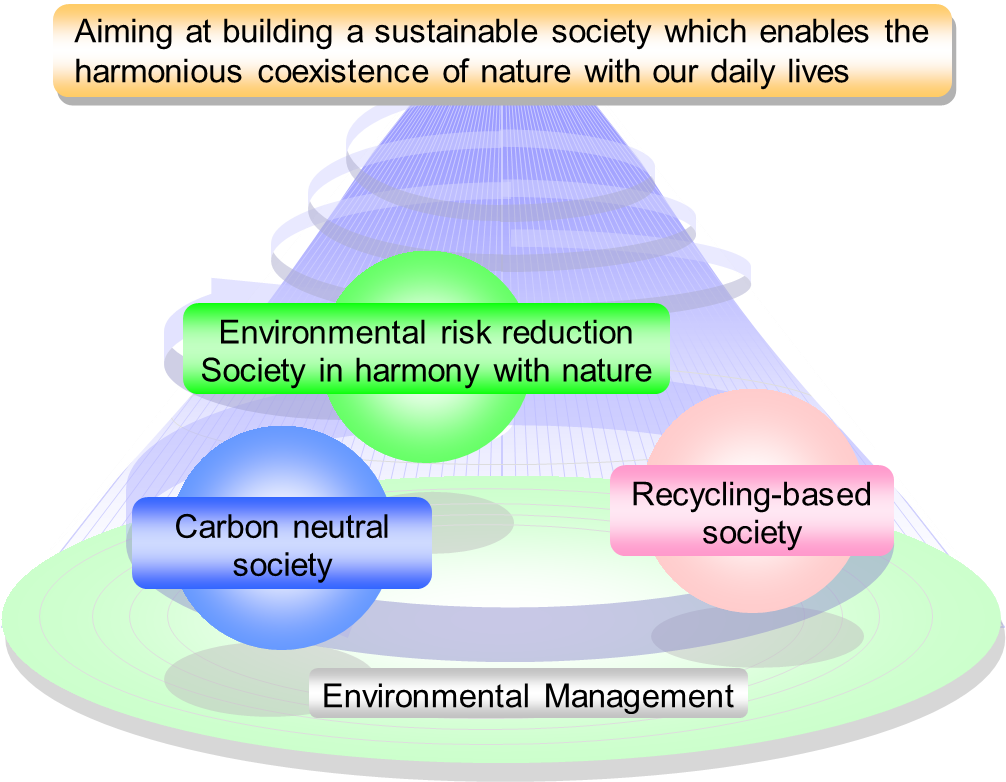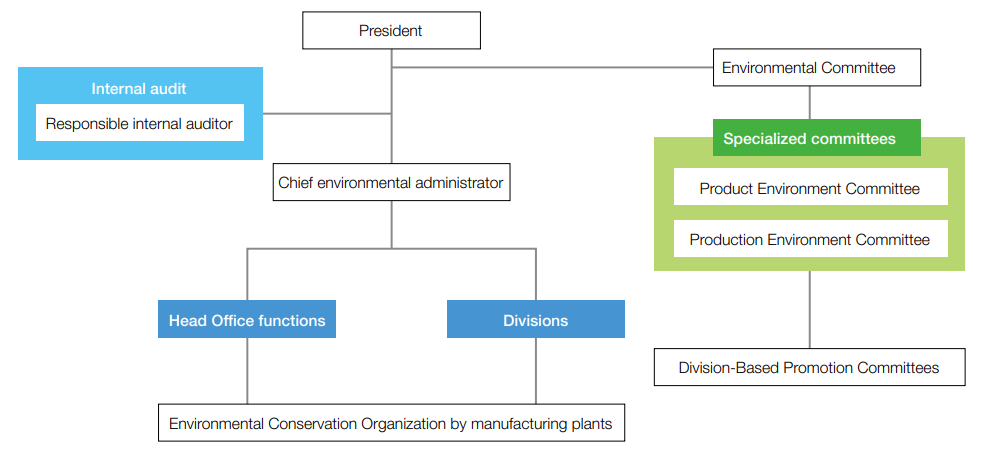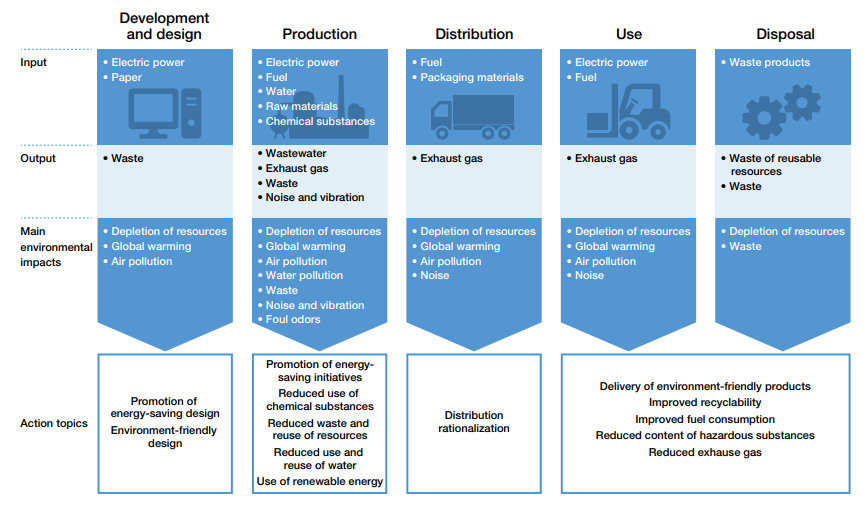Environmental Management
This page describes Toyota Industries’ environmental action policies, targets, and management systems for achieving the Environmental Vision 2050.
Environmental Policies
Global Environmental Commitment
We will strive for the preservation of the Environment across all of our business activities and will work to develop, establish and promote technologies that are compatible with both the environment and economic activity, aiming to create a rich natural environment for future generations while establishing a sustainable society which enables the harmonious coexistence of nature with our daily lives.
Guiding Principle
We will continue to set challenging targets for further reduction of the environmental impact of our business operations, while at the same time listening carefully to the voices of our customers and stakeholders and acting in compliance with the letter and sprit of laws and regulations.
We will place the following four items as the highest priority among environmental activities and proactively work on each item.
・Establishing a carbon neutral society;Setting the prevention of global warming as our highest priority,
-We will press forward the development of products and technologies for pursuing superior energy efficiency throughout the lifecycle of products.
-We will reduce the energy consumption of all our business operations and promote the use of clean energy.
・Establishing a recycling-based society;
-We will promote the effective use of resources at the developing stage of products.
-We will seek to minimize our resource consumption and to implement production activities that reduce the amount of unwanted substances.
・Reducing environmental risk and establishing a society in harmony with nature;
-We will strive to use more environmentally friendly chemical substances in our products.
-We will seek to minimize environmental risks by working to develop environmentally burden free production activities.
-We will evaluate and understand how business operations impact biodiversity and take actions based on the results.
・Promoting environmental management;
-We will develop environmental specialists who can take the initiative, and extend environmental awareness not only to our employees,
but also to their families and communities.
We will aim to foster greater communication and teamwork within a wide range of partnerships, including those with customers and suppliers, in order to promote sustainable management of the environment. In addition, the Toyota Industries Group will act as an upstanding corporate citizen, taking an active part in the planning of activities that contribute to various regional communities as well as to our global society.
March 25,2021
Toyota Industries Corporation
Akira Onishi
Environmental Vision 2050
(1) Establishing a carbon neutral society
⇒ Globally take on challenge of establishing net zero CO2 emissions society
(2) Establishing a recycling-based society
⇒ Take on challenge of minimising the use of resources
(3) Reducing environmental risk and establishing a society
in harmony with nature
⇒ Generate positive influence on biodiversity
(4) Promoting environmental management
⇒ Enhance consolidated environmental management
and promote enlightenment activities


Promotional Structure
Toyota Industries positions environmental initiatives as one of its most crucial management issues. In order to promptly reflect management decisions in business operations, Toyota industries established and operates a company-wide integrated environmental management system (EMS) with the president at the top.

Environmental impact of business activities
We have been striving to grasp the overall picture of the use of natural resources and energy, and the consequential environmental impact over the entire life cycle of the product from the planning, development and design of a new product to its disposal, with the aim of promoting efficient activities and reducing environmental impact. The input includes sources of energy such as power, water, paper used in offices, raw materials used for manufacturing the product, various kinds of chemical substances used in the production process, and fuel for transport vehicles used in the distribution stage. The effect of their consumption is the depletion of natural resources. The output includes wastewater, exhaust gas and other wastes generated in the manufacturing stages, and carbon dioxide produced by the consumption of fuel and energy, which have various environmental impacts. To reduce these environmental impacts, we have been establishing daily controls, setting goals and promoting environmental activities.

Seventh Environmental Action Plan
To achieve the Environmental Vision 2050, Toyota Industries adopted the five-year Seventh Environmental Action Plan, covering the period from fiscal 2022 to fiscal 2026, and is taking action under the plan. The Seventh Environmental Action Plan sets targets based on the four pillars of the Global Environmental Commitment.
(1)Establishing a carbon neutral society
(2)Establishing a recycling-based society
(3)Reducing environmental risk and establishing a society
in harmony with nature
(4)Promoting environmental management
Toyota Industries Group will work as one to take on
the challenge of achieving these targets.
 Seventh Environmental Action Plan [204.1KB / 1page]
Seventh Environmental Action Plan [204.1KB / 1page]
┗ Results of FY 2025 [309.7KB / 2pages]
Results of FY 2025 [309.7KB / 2pages]

ISO 14001 Certification and Internal Audit
ISO 14001 Certification Status
Toyota Industries and it's consolidated subsidiaries have made considerable progress in acquiring ISO 14001 certification. Currently, 37 of a total of 41 Toyota Industries Corporation and its production subsidiaries subject to environmental management have obtained certification. (90.2%)
The current status of certification is shown below.
 ISO14001 Certification Status List [196.6KB / 1page]
ISO14001 Certification Status List [196.6KB / 1page]
Internal Environmental Audits
We conduct independent, high-quality internal audits based on the Environmental Management System.We have established an internal audit structure with the General Manager of the Corporate Environmental Management Department in charge of internal audits, a team leader who is responsible for internal audit practices, and auditors selected from each business division.The internal auditor detects underlying problems in each organization, and each of these organizations implements corrective measures to address these problems.
| Audit Organization | Role |
|---|---|
| Responsible internal auditor | Overall responsibility for internal environmental audits |
| Team leader | Responsible for implementing company-wide internal environmental audits |
| Sub leader | Responsible for implementing business division internal environmental audits |
| Head supervisor and Auditors | Responsible for implementing department internal environmental audits |
Education and Raising Awareness
Toyota Industries organizes the environmental knowledge and abilities needed for each job category and title and develops environmental education programs based on the results. Specifically, we conduct rank-based education, provide introductions to environmental management and environmental audits, and conduct education on environmental responses for products and other topics. In addition to such environmental education, we invite outside lecturers to teach courses on the environment, run special features about the environment in internal newsletters, and make other efforts to raise employee awareness regarding the environment.
